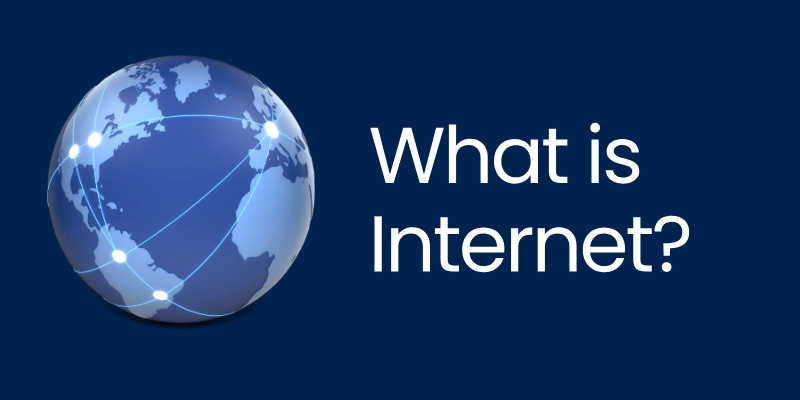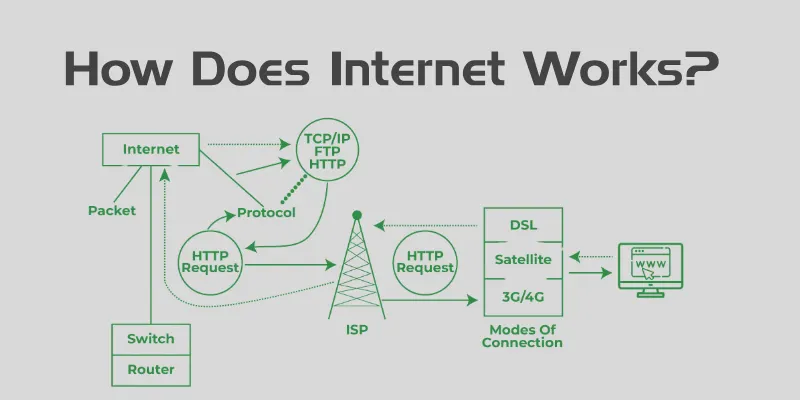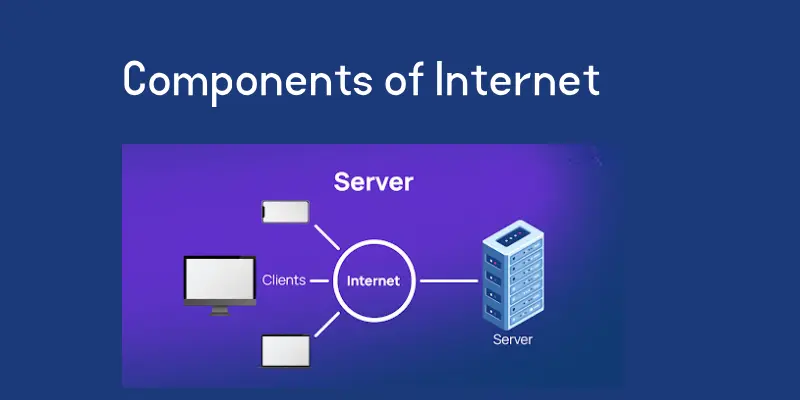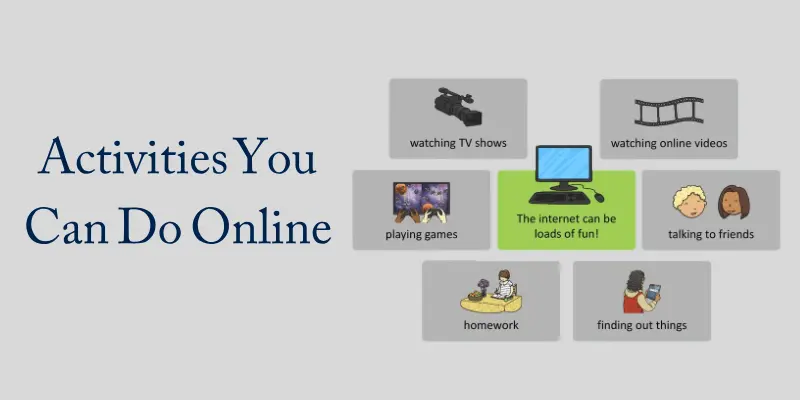What is the Internet – Complete Guide
Published: 17 Mar 2025
Have you ever wondered how the Internet works or what it is? It’s more than just a tool for browsing social media or streaming movies. It is the backbone of modern life. Understanding the Internet is essential because we rely on it for work, communication, learning, and even running our homes.
The Internet is one of the greatest inventions in history. It connects billions of people worldwide and makes information just a click away.
In this article, we’ll explore what the Internet is, how it functions, and why it’s so important in today’s world. By the end, you’ll have a clear and simple understanding of this fantastic technology!

What is the Internet?
The Internet is a global network that connects millions of computers and devices, allowing them to share information. It works by linking computers through cables, satellites, and wireless signals so they can communicate with each other.
For instance, when you browse websites, stream videos, or send emails, your device connects to the Internet to share and receive data quickly.

How Does the Internet Work?
The Internet works by breaking data into small pieces called “packets.” These packets travel between devices using a network of cables, satellites, and wireless signals. It is like sending letters through a postal system, but it is much faster.

Main Components of the Internet
- Servers: Powerful computers where websites and online content are stored.
- Clients: Devices like phones, tablets, or computers that request information from servers.
- ISP (Internet Service Provider): Companies that connect your device to the Internet, such as AT&T, Verizon, or Comcast.
Example of How the Internet Works
When you search for “cute cat videos” on your phone, here’s what happens:
- Your phone sends a request (as data packets) to a server through your ISP.
- The server finds your desired videos and sends the data packets back to your phone.
- These packets reassemble on your screen, and voila! Cute cat videos start playing.
What Can You Do on the Internet?
The Internet offers countless activities that make our lives easier and more enjoyable. Here are some of the main things you can do online:
1. Browsing
One of the most common things to do on the Internet is browsing. This means visiting different websites and searching for information. Whether you’re looking up how-to guides, reading news articles, or researching school projects, the Internet makes finding information quick and easy.
2. Communication
The Internet is perfect for staying connected. You can send emails, chat with friends or family through messaging apps, and even make video calls. This helps you stay in touch with people no matter where they are in the world.

3. Entertainment
The Internet is a great source of fun. You can watch movies and TV shows, listen to music, and play games online. Streaming services and music apps let you enjoy your favorite shows and songs anytime.
4. Shopping
Shopping online has become very popular. You can buy clothes, gadgets, groceries, and more without leaving your house. Websites like online stores make it easy to find what you need and have it delivered right to your door.
Brief History of the Internet
Here is the brief history of internet.
1960s – ARPANET
The Internet began with ARPANET, a U.S. government project to connect computers for research purposes.
1983 – TCP/IP Protocol
The TCP/IP protocol was introduced, allowing different networks to communicate, forming the basis of the modern Internet.
1989 – World Wide Web (WWW)
Tim Berners-Lee invented the World Wide Web, making it possible to create and browse websites.
1991 – First Website
The first website was launched, offering information about the World Wide Web itself.
1990s – Internet Boom
The Internet grew rapidly with the rise of web browsers like Netscape and Internet Explorer.
2000s – Broadband and Wi-Fi
Faster Internet connections and wireless technologies like Wi-Fi made the Internet more accessible.
Today
The Internet is an essential part of daily life, connecting billions of people worldwide for work, entertainment, learning, and more.
Tips for Safe Internet Use
While the Internet is amazing, it’s important to stay safe. Here are some simple tips:
- Choose Secure Websites: Look for websites that have “https” in their web address. This means they are secure and protect your information.
- Protect Your Personal Information: Avoid sharing sensitive details, like your address or phone number, on public sites.
- Use Strong Passwords: Make sure your passwords are unique and hard to guess to keep your accounts safe.
- Be Careful with Links: Don’t click on suspicious links or ads, as they could be harmful to your device or privacy.
The Internet is full of amazing things to do, but it’s important to use it wisely and stay safe!
Why is the Internet Important?
The Internet is an essential part of our daily lives. It makes work and education easy and helps to stay connected more easily and efficiently. It helps people work from home, access online learning, and stay in touch with friends and family through social media and messaging apps.
The Internet has created many new opportunities for businesses. It lets them advertise products, sell online, and connect with customers all over the world. The Internet has changed the way we live, work, and communicate. Today, it is an essential tool in our daily lives.
Conclusion
In conclusion, we explored what the Internet is, how it works, and its importance in our daily lives. From connecting devices to helping businesses grow, the Internet has changed the way we communicate, work, and learn.
Share your thoughts or ask any questions in the comments below! We’d love to hear from you.
FAQs
Here are some frequently asked questions about the Internet to help clarify things.
The Internet is the network that connects computers worldwide. The World Wide Web (WWW) is a system of websites that you can access through the Internet.
The Internet can be safe, but it depends on how you use it. Be careful with personal information and avoid clicking on unknown links or downloading suspicious files.
Internet speed varies. It depends on your internet service provider (ISP) and your plan. Faster speeds allow you to stream videos, play games, and download files more quickly.
Vint Cerf and Bob Kahn invented the internet in the 1970s by creating the TCP/IP protocols. These protocols made the modern internet possible.
There are several types of Internet connections, including DSL, cable, fiber-optic, satellite, and mobile data (3G/4G/5G). Each has different speeds and reliability levels depending on your location and provider.
Wi-Fi is a wireless technology that lets devices connect to the Internet without cables. It’s powered by a router that’s connected to your ISP.
In most cases, you need an ISP to access the Internet. However, some public places offer free Wi-Fi, and some mobile devices can share their data connection as a hotspot.
An IP (Internet Protocol) address is a unique number assigned to each device connected to the Internet. It helps identify and locate devices to send and receive data correctly.
Yes, the cloud refers to Internet-based storage and services. Instead of saving files on your device, they are stored on remote servers that you can access via the Internet.
The Internet has revolutionized education by making online learning, research, and virtual classrooms possible. Students and teachers can access information and resources anytime, anywhere.

- Be Respectful
- Stay Relevant
- Stay Positive
- True Feedback
- Encourage Discussion
- Avoid Spamming
- No Fake News
- Don't Copy-Paste
- No Personal Attacks

- Be Respectful
- Stay Relevant
- Stay Positive
- True Feedback
- Encourage Discussion
- Avoid Spamming
- No Fake News
- Don't Copy-Paste
- No Personal Attacks





